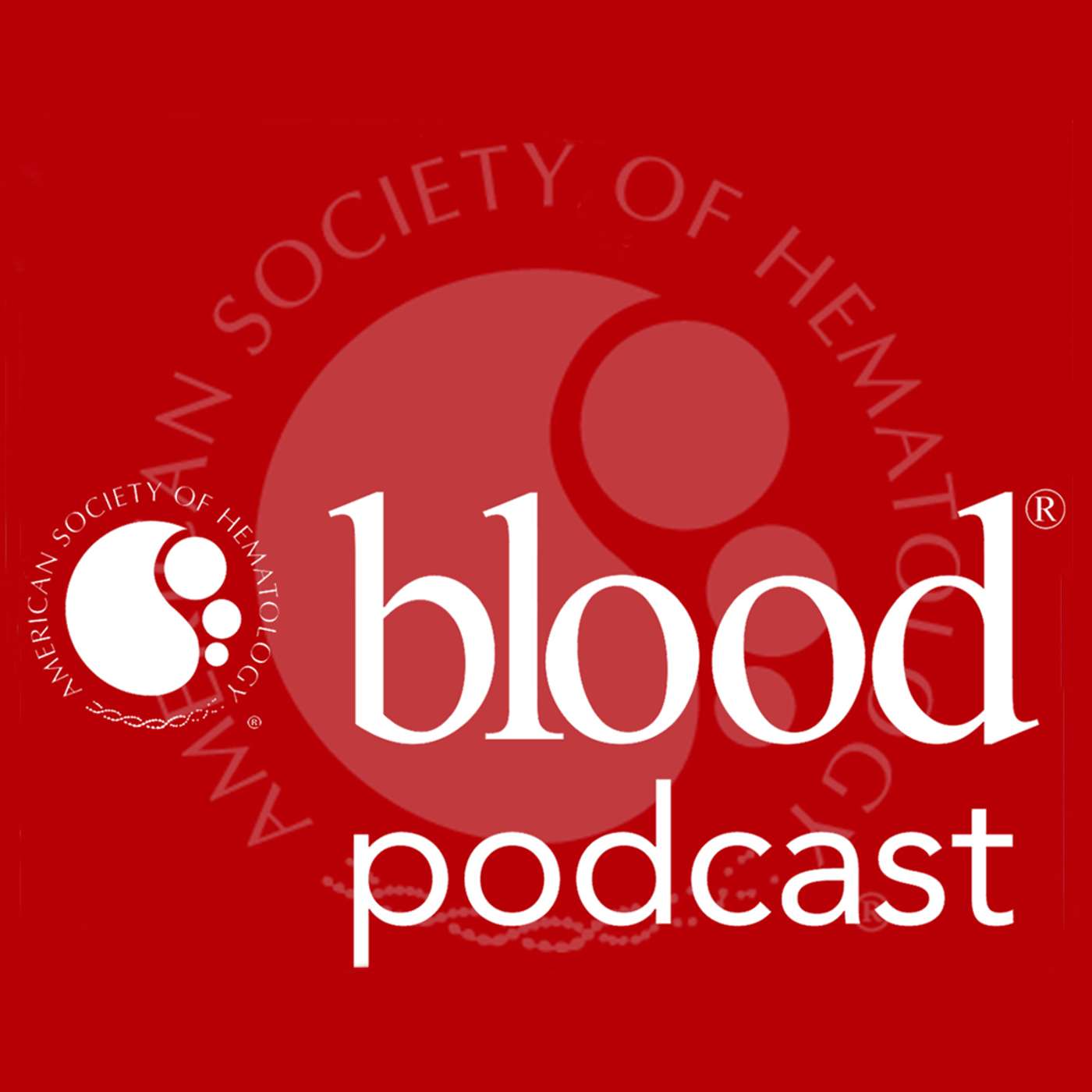

Blood Podcast
American Society of Hematology
The Blood Podcast summarizes content recently published in Blood, the most cited peer-reviewed publication in the field of hematology.
Episodes
Mentioned books

Jan 15, 2026 • 18min
How I Treat Series on Hematologic Complications in Pregnancy
In this week's episode, Blood Associate editor Dr. Thomas Ortel interviews authors Drs. Ware Branch and J.J. Strouse on their contributions to How I Treat hematologic complications in pregnancy. Dr. Branch's paper, “How I diagnose and treat antiphospholipid syndrome in pregnancy” discusses the evolving clinical and laboratory features of APS, and the treatment of cases meeting ACR/EULAR classification criteria. Dr. Strouse stresses the unique problems posed to both the mother and fetus during pregnancy in his paper "How I treat sickle cell disease in pregnancy”.See the full How I Treat series in volume 143 issue 9 of Blood journal.

Jan 8, 2026 • 27min
Review Series on Marginal Zone Lymphoma
This week's episode accompanies the Review Series on Marginal Zone Lymphoma published in this week's issue of Blood. Associate editor, Dr. Philippe Armand interviews authors Dr. Juan Pablo Alderuccio and Dr. Ariela Noy on their contribution to this review series titled "The treatment of marginal zone lymphoma". The article is crucial in highlighting the clinically and biologically heterogenous nature of MZL diseases, and how current treatment options and available research do not allow for comprehensive MZL specific therapies. Drs. Alderuccio and Noy share their insights on specific avenues for the expansion of the MZL care landscape. Find the full review series in volume 147 issue 2 of Blood journal.

Jan 1, 2026 • 15min
VTE Recurrence Risk Factors and poor-response AML Transplant Outcome Indicators
In this week's episode we've pulled a vault recording from 2025! Blood editor Dr. Laurie Sehn interviews authors Drs. David-Alexandre Trégouët and Johannes Schetelig on their research published in volume 146 issue 19 of Blood journal. Dr. Trégouët's study conducted a genome-wide association study supplemented by transcriptome and Mendelian randomization analyses to identify 28 loci and proteins associated with VTE recurrence risk. This work provides genomic evidence that inherited variants contribute to the risk of VTE recurrence, raising the possibility of a more personalized approach to the prevention of recurrent VTE. The study conducted by Dr. Schetelig and colleagues report the results of a long term trial on patients with poor-response AML, comparing outcomes between patients who received salvage chemotherapy versus immediate transplantation. With no difference in survival rates at 5 years, outcomes seem to be determined mainly by genetic risk factors, age, and comorbidities, therefore challenging the routine use of intensive remission induction before allogeneic transplant in patients with an available donor and underscore the need for novel therapeutic strategies for poor-risk AML.Featured Articles:Molecular Determinants of Thrombosis Recurrence Risk Across Venous Thromboembolism Subtypes Disease risk but not remission status determines transplant outcomes in AML: long-term outcomes of the ASAP trial

Dec 25, 2025 • 24min
Novel Treatment Targets for Hemophilia A and AML
Join researcher Vincent Muczynski, who presents a groundbreaking AAV gene therapy strategy for hemophilia A using a novel bispecific antibody. He details impressive preclinical results showing promise in correcting bleeding in mice. Clinician-scientist Mark Geyer unveils his phase 1 study on CD371-targeted CAR T cells infused with interleukin-18, which shows potential in tackling relapsed/refractory acute myeloid leukemia. Translational scientist Susan DeWolf shares insights from their analyses, revealing how interleukin-18 fosters immune remodeling and enhances treatment effectiveness.

Dec 18, 2025 • 20min
Novel Differentiation Therapies for AML and Prognostic Value of PET in MM
Vijay Sankaran, a physician-scientist in hematology research, Ruud Delwel, a leukemia biology expert, and Françoise Kraeber-Bodere, a nuclear medicine physician, delve into groundbreaking studies on the MECOM gene's impact on acute myeloid leukemia therapies. They explore how MECOM repression might enhance CEBPA expression to promote differentiation in leukemias. Also discussed are the promising results from the CASSIOPET study showing that pre-maintenance PET negativity is a strong prognostic indicator for multiple myeloma outcomes.

Dec 11, 2025 • 19min
Review Series on Platelet Heterogeneity
Join platelet experts Craig Morrell, Leo Nicolai, and Larry Frelinger as they dive into the fascinating world of platelet heterogeneity. Morrell reveals how diverse megakaryocyte origins impact platelets' varied functions and production in organs like the lung and spleen. Nicolai discusses the critical roles of procoagulant platelets in thrombosis and inflammation using innovative mouse models. Frelinger sheds light on how platelet age influences their characteristics through advanced phenotyping techniques, addressing the challenges in therapeutically targeting these essential cell subsets.

Dec 5, 2025 • 21min
Special Episode: Maternal Health in Hematology
Dr. Arielle Langer, a physician-scientist focusing on women's health, shares her groundbreaking research on beta-thalassemia minor and its links to anemia in pregnancy, revealing concerning patterns in hemoglobin changes. Dr. Marc Blondon, an angiologist, discusses his findings on estrogen-related thrombotic biomarkers, illuminating how quickly these risks return to normal after halting hormonal contraceptives. Together, they explore critical clinical implications for maternal health, including risks during labor and necessary practice changes for safer hormone use.

Dec 4, 2025 • 16min
Analysis of IELSG37 Trial Results and PF4 in Stem Cell Aging
In this discussion, Emanuele Zucca, an oncologist and lymphoma expert, delves into the IELSG37 trial, revealing that the standard R-CHOP21 regimen for primary mediastinal B-cell lymphoma may be less effective than hoped. Sen Zhang, a researcher in pharmacology, explores platelet factor 4's critical role in stem cell aging, highlighting how PF4 deficiency accelerates aging traits in stem cells. Both experts emphasize translational implications for improving therapies and rejuvenating aged hematopoietic stem cells, sparking new hope in regenerative medicine.

Nov 27, 2025 • 22min
Fixed-Duration Epcoritamab Combination Therapy for Relapsed or Refractory Follicular Lymphoma and Pre-Transplant Strategies for GVHD post-HSCT
In this week's episode, Blood editor Dr. Laurie Sehn interviews authors Drs. Lorenzo Falchi and Robert Levy on their latest papers published in Blood Journal. Dr. Falchi discusses his work on an open-label, multicenter phase 1b/2 study evaluating fixed-duration epcoritamab with rituximab and lenalidomide in 108 patients with relapsed or refractory follicular lymphoma. Dr. Levy shares his work on demonstrating that in vivo expansion of Tregs in recipients prior to transplant is possible by activating TNFRSF25 (also known as death receptor 3) in combination with low-dose interleukin-2 in preclinical models. Both papers showed impressive and promising results for the treatment of lymphoma and GVHD.Featured ArticlesFixed-Duration Epcoritamab Plus R2 Drives Favorable Outcomes in Relapsed or Refractory Follicular LymphomaPre-transplant targeting of TNFRSF25 and CD25 stimulates recipient Tregs in target tissues ameliorating GVHD post-HSCT

Nov 20, 2025 • 15min
Advancing Blood Disorder Treatments Through Precision Therapeutics
Terri Parker is a hematologist and clinical researcher focusing on AL amyloidosis, while Peter Lenting specializes in bleeding disorders. They discuss groundbreaking advancements in treatments for these conditions. Parker reveals impressive results from a phase 2 trial using isatuximab in AL amyloidosis, showcasing a 77% hematologic response. Meanwhile, Lenting shares his innovative work on a bispecific nanobody designed to extend the half-life of von Willebrand factor, potentially transforming care for patients with type 1 VWD.


